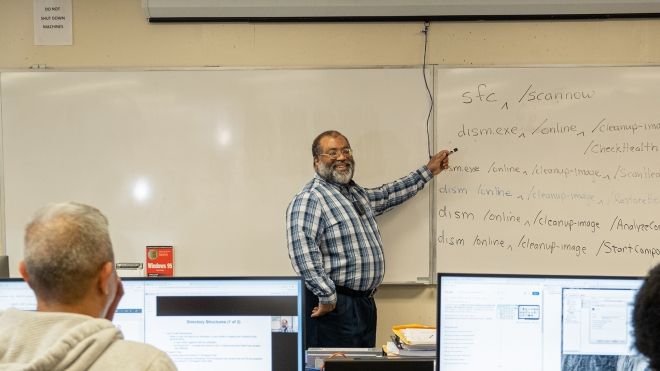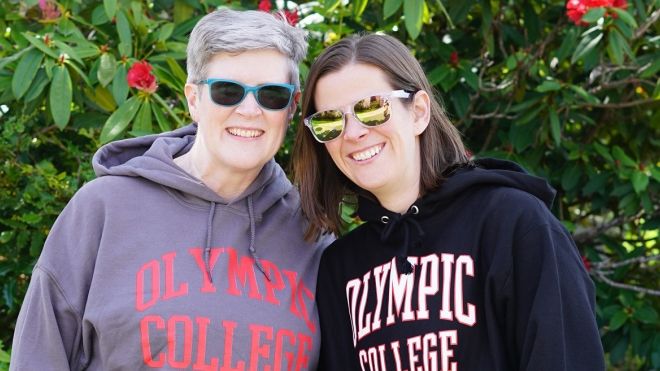Being a leader isn’t just about telling people what to do. It’s about listening to your team and making sure their needs are met. That’s the idea behind servant-leadership, a concept that emphasizes the responsibility of leaders to serve those they are leading.
Dr. Philip Mathew, a professor in Olympic College’s Organizational Leadership & Technical Management program, has synthesized some of the best thinking on servant-leadership into a new book released last month: Global Servant-Leadership: Wisdom, Love, and Legitimate Power in the Age of Chaos.
Mathew was the book’s primary editor, along with colleagues Jiying Song, Shann Ray Ferch and Larry C. Spears. It compiles international perspectives on servant leadership through essays, case studies, and readings of the latest research from more than two dozen contributors, from places as varied as the U.S., Brazil, Canada, Kenya, Singapore, Saudi Arabia and Tanzania.
“They’re thought leaders and practitioners from around the globe,” Mathew says. “They represent all these different countries, cultures, and communities and are at the forefront of the study and practice of servant-leadership.”
The concept of servant-leadership goes back for millennia, and no single country or culture can lay claim to it as solely their own idea, a truth exemplified by the geographical diversity represented in the book, Mathew says. "Servant-leadership is basically about serving the highest priority needs of others. It's about giving your life away for other people, so that their highest needs are met," he says.
Traditional leadership tends to be hierarchical; it’s often compared to a pyramid where the senior leader is at the top of an organization and ensures the organization’s mission is fulfilled. Servant-leadership inverts the pyramid, so the leader is at the bottom serving everyone else in the organization, Mathew says. “They empower people to make decisions, to take actions. At its very core, I’d say servant-leadership is a reversal of power. It reverses what we normally think about leadership and power, because it’s a people-first type of leadership approach.”
That’s not to say that aspects of traditional leadership structures aren’t important, Mathew says. Servant-leadership acknowledges the leader’s role to provide direction and a sense of mission. But once those core responsibilities are met, servant-leadership pivots toward the servant role. “It’s saying you can’t forget that the only reason the mission is accomplished is because of the people,” he says. “The leader steps back and puts the people forward and unleashes and empowers them to get the work done. So you need both. It’s about being both a servant and a leader.”
The International Journal of Servant Leadership played a key role in the book’s formation. Many of the essays and case studies originated in the journal, and Ferch and Song are the journal’s editors. Spears is on the journal’s editorial board, and Mathew is on the journal’s peer-review board.
The book’s emphasis on collecting diverse, global perspectives is a benefit to those who read it, Mathew says. “We live in a global era, so the influence of people, organizations and systems from different cultures and institutions — that diversity is so important. You have to have that global mindset that spans beyond your region, your culture, your context. The book allows leaders around the world to see that leadership is so much bigger than what we traditionally understand it as here in the West.”
The book also sheds light on the fact that Western concepts of leadership place a greater emphasis on individualism than elsewhere in the world, Mathew says.
“We have a very individualized leadership ethos, where the emphasis is on individual responsibility: who gets the credit, who gets the blame, who needs to make changes, versus what we find in servant-leadership in other countries outside of the West, is a collectivist mindset: How do we move together collectively? Instead of individual responsibility, it’s about being responsible together.”
The book is published by an academic press, which makes it a great fit for libraries and universities, but Mathew says he and his fellow editors wanted to be sure to include practical examples as well. “We really wanted to include not just research, but also essays and case studies about people actually on the ground — what I like to call flesh-and-blood examples of servant-leadership in action. There’s definitely an academic tone to the book, but readers are also going to find case studies, stories, and essays related to how it’s actually being worked out in daily life.”
More information about the book can be found on the publisher’s website.


